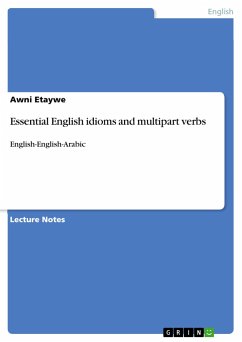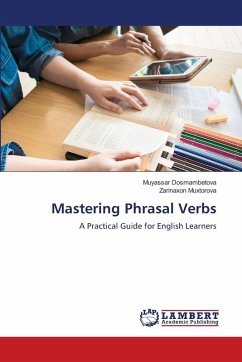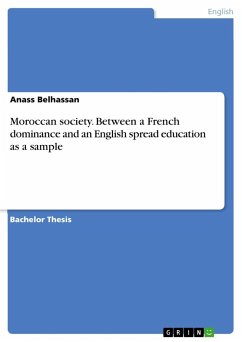
Essential English idioms and multipart verbs
English-English-Arabic

PAYBACK Punkte
0 °P sammeln!
Script from the year 2017 in the subject English Language and Literature Studies - Linguistics, grade: 91.1, , language: English, abstract: An 'Idiom' is an expression in the usage of a language that has a meaning that cannot be derived from the conjoined meanings of its elements; for example "raining cats and dogs" is an expression that is used to convey the meaning of "raining heavily", but this meaning most of the time cannot be derived from the denotative meaning of the single words that constitute the whole expression. Moreover, an idiom can be looked at as a combination of words whose me...
Script from the year 2017 in the subject English Language and Literature Studies - Linguistics, grade: 91.1, , language: English, abstract: An 'Idiom' is an expression in the usage of a language that has a meaning that cannot be derived from the conjoined meanings of its elements; for example "raining cats and dogs" is an expression that is used to convey the meaning of "raining heavily", but this meaning most of the time cannot be derived from the denotative meaning of the single words that constitute the whole expression. Moreover, an idiom can be looked at as a combination of words whose meaning can be either transparent (can be easily worked out of the literal meaning of the individual words) or opaque (there is no resemblance between the meaning of the individual words and the meaning of the idiom itself).Consider the following examples of transparent idioms that are reasonably obvious:1. 'Throw someone to the lions' means 'intentionally to put someone in a difficult position', as in: All the commanders were responsible for the tragedies in their last operation, but they threw that junior officer to the lions when they asked him to address the journalists on the reasons of defeat.Idioms like 'sell someone down the river' and 'kick the bucket' are examples of the opaque:1.Understanding the words of the expression 'sell someone down the river', for instance, will not help you recognize that it actually means 'to betray, or be disloyal to', as in: The kidnapper who was caught by the police refused to sell his associates down the river. Thus, having such idioms in one book and learning their meaning would be absolutely of a significant help.Interestingly, some English idioms are similar to expressions in other languages, which makes it easy for the learner to figure out their meaning, as in 'hold one's horses' which means 'to stop someone or something, or to make them calm', for example: Hold your horses, I said to my wife when she started packing her luggage.Succinctly stressed, idioms and multi-part verbs (along with their Arabic equivalents) are considered of paramount importance for a wide range of Arab learners of English. Idioms are very useful to effectively communicate with English speakers. And this treasury would be a helpful learning tool that provides learners with a large number of English idioms and phrases along with example sentences and Arabic equivalent.













